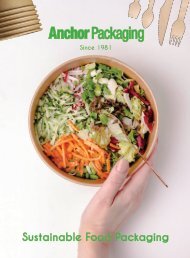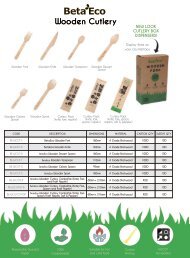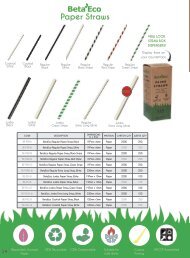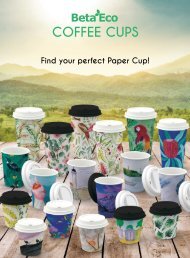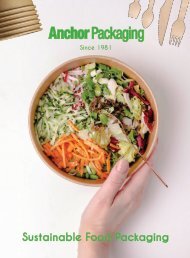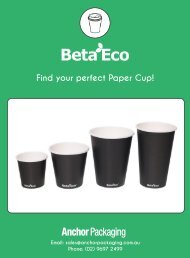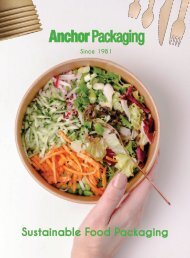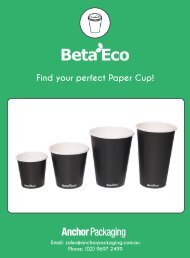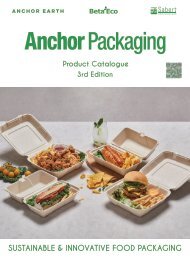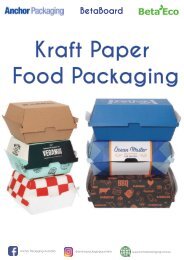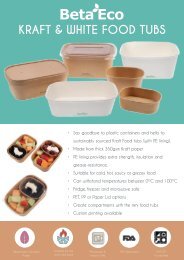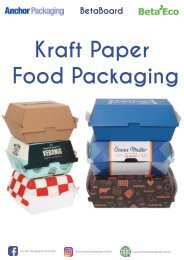PRODUCT CATALOGUE
2020 PRODUCT CATALOGUE
2020 PRODUCT CATALOGUE
Create successful ePaper yourself
Turn your PDF publications into a flip-book with our unique Google optimized e-Paper software.
Materials We Use<br />
PLA Bioplastic<br />
Polylactide (PLA) is a natural polyester derived<br />
from renewable plant material. During production,<br />
Ingeo PLA emits up to 80% less CO2 than the<br />
comparable manufacture of traditional plastic<br />
like PS and PET*. It looks, feels and performs<br />
like traditional plastic, but is low-emission and<br />
plant-based to make for a more sustainable product.<br />
PLA is routinely composted around the world in<br />
commercial facilities and holds multiple international<br />
composting certificates.<br />
Pulp<br />
Moulded-fibre pulp products are made of a sugar<br />
cane manufacturing by-product, called Bagasse,<br />
an abundant and renewable resource. In the<br />
food packaging sector, this natural cellulose is<br />
one of the best sustainable alternatives to plastic.<br />
It meets all requirements and is not in any way<br />
harmful. It is oven proof, microwavable and freezer<br />
friendly. Most importantly, it is 100% compostable<br />
(suitable for industrial and home composting) and<br />
rapidly biodegradable. It takes only 180 days to<br />
decompose 1 pulp platter.<br />
*Life Cycle Inventory and Impact Assessment data for 2014 Ingeo Polylactide<br />
Production. Industrial Biotechnology, June 2015<br />
Palm Leaf<br />
Made from the fallen leaves of a palm tree, Palm<br />
Leaf products are one of the most natural materials.<br />
The palm leaf is collected, washed from dirt and<br />
then moulded into plates and bowls. No chemicals,<br />
dyes, glues, lacquers or toxins are used in the<br />
manufacturing process.<br />
Wood<br />
Choosing wood as an alternative to plastic is an<br />
environmentally friendly option because it is a natural<br />
biodegradable material. It is free from chemicals<br />
and other harmful products, and produced from<br />
responsibly managed forests.<br />
Wheat<br />
Wheat fibre, which is often considered an agricultural<br />
waste product, is a resourceful material for food<br />
packaging. It is an attractive environmentally friendly<br />
biodegradable material that will lessen the burden<br />
on landfills.<br />
Paper<br />
Trustworthy and most importantly renewable,<br />
paper is an important raw material that replaces<br />
many everyday plastic products. Where possible,<br />
we use paper sourced from responsibly managed<br />
plantations. Paper packaging makes for naturally<br />
elegant and durable food packaging.<br />
PP<br />
Polypropylene (PP) is a crystal clear,<br />
functional, durable, resealable and reheatable<br />
plastic. It is one of the most widely accepted material<br />
for recycling.<br />
PET / PETE<br />
Polyethylene terephthalate (PETE or PET) is a<br />
lightweight plastic that is made to be semi-rigid or<br />
rigid which makes it more impact resistant, and helps<br />
protect food or liquids inside the packaging. It is<br />
entirely recyclable.<br />
PVC<br />
Polyvinyl Chloride (PVC) is another type of<br />
recyclable plastic material that offers<br />
excellent clairty, strength and sealing performance.<br />
5



